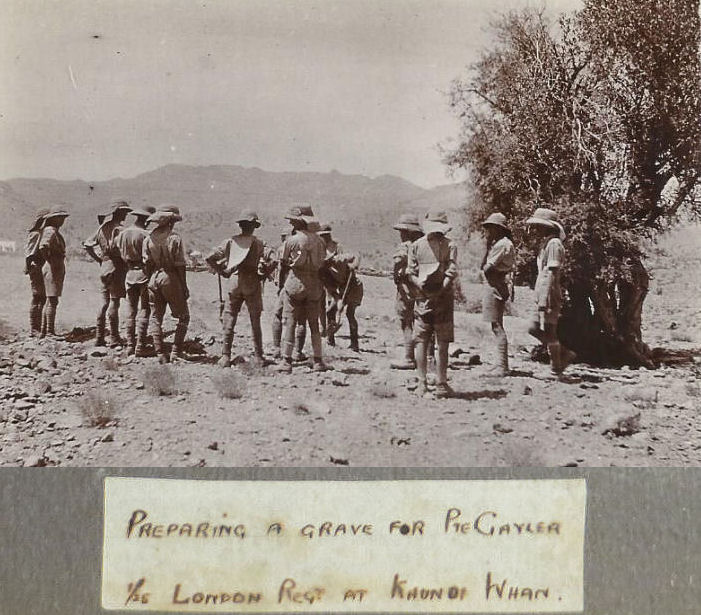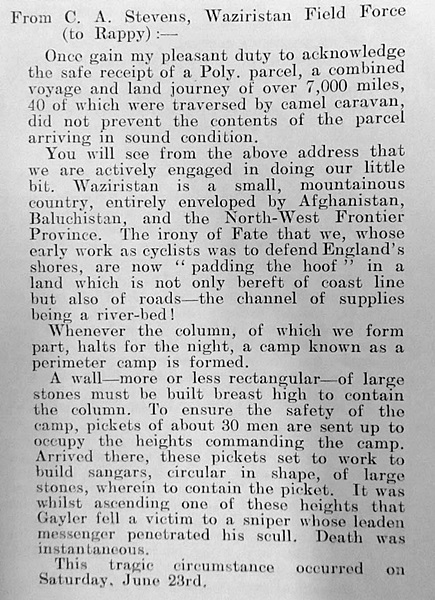|
|
25th County of London Cyclist Battalion |
|
Herbert Henry GAYLER (Bert) |
|
Soldiers Died in the Great War 1914-19 His death is described in the account of the Waziristan
campaign by Henry Paine :- Herbert Henry Gayler was born in Chiselhurst, Kent on the 3rd of December 1881, the son of Henry Gayler, a coachman and Annie (nee Palmer). His mother died when he was still very young so his aunt Ellen Palmer, a dress maker living in Norfolk, came to look after Herbert and his brother Ernest. Ken to better himself he attended Regent Street Polytechnic (forerunner of the University of Westminster). In the 1901 census Herbert is listed as a Barrister's Clerk, and in 1911 as a Clerk Stenographer.
Cycling was always Herbert's passion. He was a prominent and office-bearing member of the Polytechnic Cycling Club (PCC), which was part of the Regent Street Polytechnic Institution (which went on to become the Polytechnic of Central London and is now the University of Westminster). There are mentions of his racing achievments in almost every monthly issue of the Polytechnic Magazine between 1991 and 1914, the year when he enlisted in the 25th County of London Cyclist Bn. Gayler was also an Olympian, one of four PCC members who formed part of the twelve member team that represented England in the 1912 Olympics. He took part in two events, men's road race, single, where he came 30th, and men's road race team, which came 2nd overall winning the silver medal. A Gayler Memorial Cup was instituted after his death, for a race which took place every yera between 1919 and 1969. The esteem within which Gayler was held among his peers at the Polytechnic is evident from the obituaries and letters of regret in the PCC Gazette as well as the Polytechnic Magazine that followed news of his demise. [Polytechnic Magazine, July 1917] The University archive has a collection of old newsletters and cycling club gazettes which mention Gayler or have letters from him sent while he was a soldier. They kept an active service register during the war, and published a Roll of Honour of soldiers killed. There are many letters expressing regret at Gayler's death, and the PCC instituted a 12-hour road race in his honour, which was run for many decades. [This paragraph in part courtesy of Naheed Bilgrami a MA student at the University of Westminster - Dec 2016] [Also extracts from 'The Extinguished Flame: Olympians Killed in The Great War' By Nigel McCrery] 
The back of the photo is inscribed :- The Funeral of HH Gayler at Kandiwam, Waziristan N.W.F. India [Original photo from the album of Reginald Cuthbert GRIFFITHS - overlaid with a better image of the burial courtesy of Lynn Heiden. A copy also exists in the University of Westminster Archive]
 (Courtesy of the University of Westminster Archives - PCC/10/2) https://westminster-atom.arkivum.net/index.php/pcc-10-2 In Memory of Private HERBERT H. GAYLER who died on 23 June 1917
Of the servicemen commemorated by name on the memorial, just over 1,000 lie in cemeteries to the west of the River Indus, where maintenance was not possible. The remainder died in fighting on or beyond the North West Frontier and during the Third Afghan War, and have no known grave. The Delhi Memorial (India Gate) stands at the eastern end of the Rajpath, or Kingsway. [Courtesy of Commonwealth War Graves Commission] |